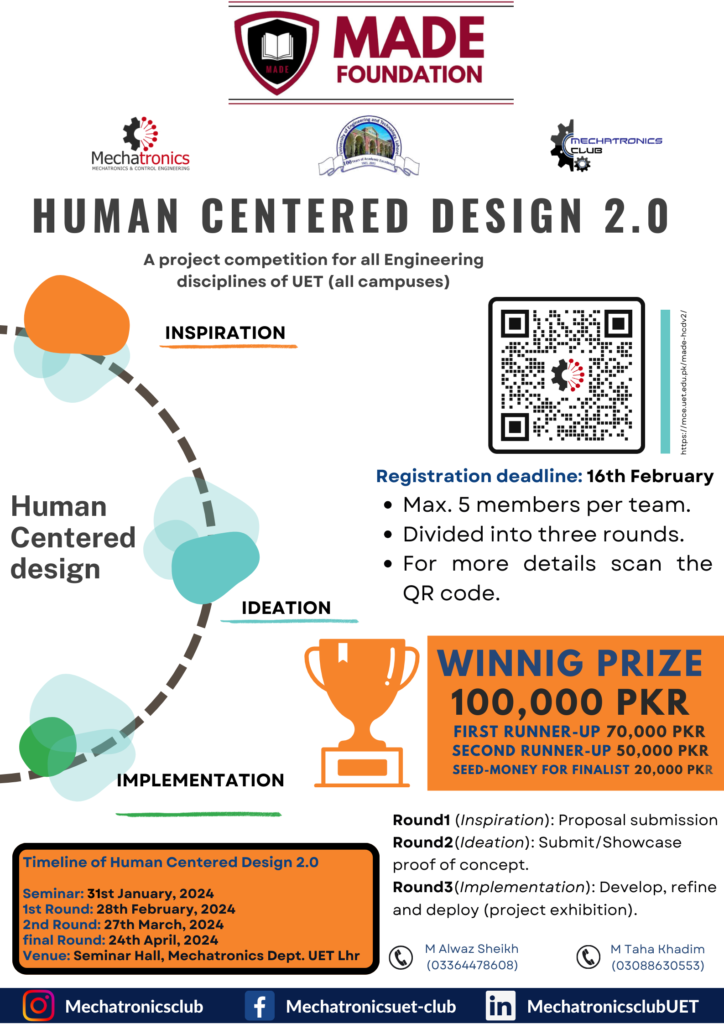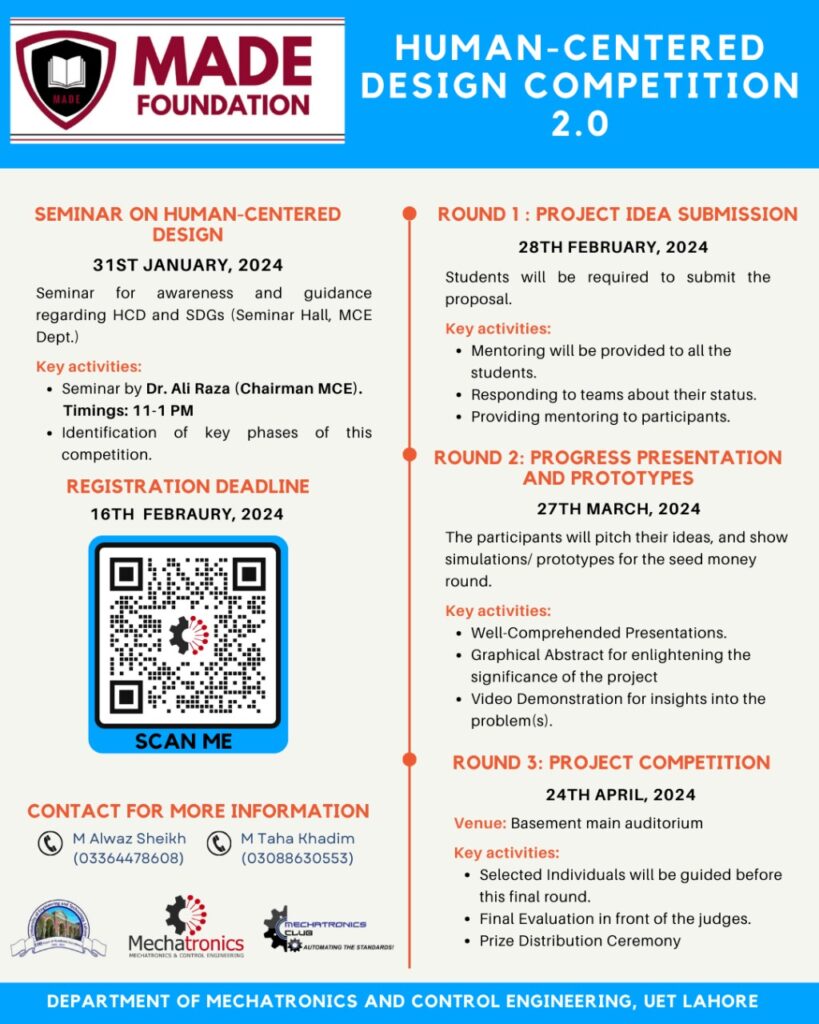Welcome to the second edition of the Human Centered Design Competition, a dynamic collaboration between the MADE Foundation USA and the esteemed Mechatronics Department at the University of Engineering and Technology (UET) Lahore. This annual event stands as a testament to our shared commitment to fostering innovation, creativity, and human-centered problem-solving.
Like last year, this year we are again excited to present a competition for all campuses of UET Lahore. The competition will showcase the most innovative ideas from the undergrad students across UET Lahore, with a central theme of ‘Human-Centered Design.

For registration please download the registration form below and submit it to the department office at Mechatronics UET Lahore.
Registration Fee: 500 PkR per group
MADExUET HCD Comp Registration
About Human-Centered Design:
Human-Centered Design (HCD) is at the core of this competition. It’s an innovative approach that prioritizes understanding the needs and perspectives of the end-users at every stage of the design process. By placing the human experience at the forefront, HCD ensures that the solutions developed are not just technically proficient but deeply resonate with the people they aim to serve. It involves empathy, ideation, prototyping, and continuous iteration to arrive at solutions that make a meaningful impact.
In the context of this competition, participants are encouraged to delve into real-world challenges, empathize with the users affected, and craft solutions that are not only technically sound but also socially and ethically responsible.
The three phases of Human-centered Designare explained below:
- Inspiration: In this stage, the people are understood. Their dreams, ambitions, desires, and hopes shape the reflection behind the actual problem. This usually requires the designer to meet, and interact with the actual end-users that will be served by their work.
- Ideation: This is the design phase where ideas are generated, and opportunities are identified to test and develop the solution with available resources.
- Implementation: In this phase, the solution is brought to life and the designers figure out how to bring it to market and maximize the benefits humans can have through it.
Click HERE to find more, and download the field guide to human-centered design.
What’s New in Version 2:
Building on the success of the inaugural competition, version 2 promises even more excitement, learning, and impactful solutions. With the continued support of the MADE Foundation USA, this edition will provide participants with an enhanced platform to showcase their creativity and problem-solving skills.
Highlights:
- Workshops: Engage in specialized workshops conducted by industry experts, providing insights into the latest trends in human-centered design.
- International Collaboration: Benefit from the collaboration with MADE Foundation USA, bringing a global perspective to your projects.
- Expanded Judging Panel: Our panel of judges includes experts from diverse fields, ensuring a comprehensive evaluation of your projects.
- Networking Opportunities: Connect with professionals, mentors, and fellow participants to broaden your network and explore potential collaborations.
Human-Centered Design Project Competition Version 2:
The competition is divided into three stages derived from the three phases of human-centered design.
- Stage 1 (inspiration): The students will identify a problem that strongly maps to at least one of the SGDs as indicated by the UNO (click on the hyperlink for details). They will submit a proposal highlighting the problem, its significance, and their interactions with the community that faces the problem.
- Stage 2 (ideation): Once the proposal is approved, the students will be given time to develop their solutions. At the end of the second stage, they will showcase their prototypes and establish proof of concept.
- Stage 3 (implementation): The top eight teams from round 2 will be given a seed fund worth PkR 20000/- each. They will develop, refine and deploy their solution in the time given, and showcase their work at an exhibition. It should be noted that even though the top teams will be given funding, any number of teams that clear stage 2 can still participate in the final exhibition.
The judging criteria is comprised of the completeness of work, its impact on humans, the market worth, and innovation.
- To facilitate the student groups, the organizing committee will arrange workshops on human-centered design.
- The prize for the competition is as follows:
| Sr. No | Category | Amount (PkR) |
| 1 | Winning Prize | 100,000 |
| 2 | First Runner-up | 70,000 |
| 3 | Second Runner-up | 50,000 |
For registration please download the registration form below and submit it to the department office at Mechatronics UET Lahore office.
Registration Fee: 500 PkR per group
MADExUET HCD Comp Registration
Seminar on HCD
The chairperson of the Mechatronics Department, Dr. Ali Raza has enlightened the students about (a) the different phases of this competition and (b) the various paradigms of human-centered design, accompanied by realistic examples. Interested applicants can find the relevant information below:
Relevant Helping Material (Slides)
Eligibility and Team Guidelines
- The maximum number of members allowed in a team is five (5). Team diversity will be encouraged so that students from different engineering disciplines may be able to collaborate.
- To be eligible for this competition, you must be a registered student of UET or one of its campuses at the time of the launch of the competition.
- The tentative timeline for the event is shared in the following infographic

